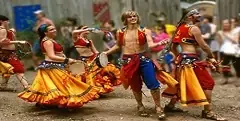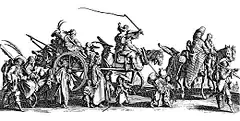Gypsies are people who migrate from one area to another in the society of the world. No one does it out of passion, there are painful reasons behind it. The word gypsy is losing its traditional and romantic charm. The word no longer casts a spell on our senses as it did a few years ago when we read the opening pages of Gabriel Garcia Marquez's book, Centennial Siege.
 |
| What is gypsy |
The
footsteps of the Gypsies have spread to all corners of the globe. The Gypsies
have maintained their civilization and cultural identity with great zeal and
zeal for centuries, despite the extremely unfavorable conditions outside their
homeland.
Wherever
they have gone and no matter how far they have gone from their roots, they have
arrogantly clung to their ancient customs.
Who are
the Gypsies?
Gypsies are
nomads, and for centuries they have lived in cities and towns. According to a
recent UNESCO study of their relationship, Gypsies scattered in Europe and now
around the world came from India about a thousand years ago. And that they are
part of India's current gypsies.
These
gypsies of India can still be seen wandering in the corners of the Indian
subcontinent. When and under what specific circumstances did he say goodbye to
the land of India forever and why?
But the fact is that during their thousand years of mysterious nomadism and migration, wherever they went, they were subjected to worse racial prejudices than India, and most of the nations of Europe fell on them.
 |
| What is gypsy |
Police have
hunted their men legally for centuries. His women were burned alive as black
sorceresses. And during World War II, the Nazis massacred some three million
Jews.
The
persecution of the Gypsies was completely forgotten by the international
community. The history of the Gypsy tribes is the worst example of racial,
religious, social, and economic prejudice and discrimination that will linger
for centuries on the face of mankind.
No one
collectively accepts the path to hell. On the contrary, people are always
forced to live a humiliating life at the hands of another human being in a
world of helplessness, and the real history of people is the same human action.
Given the plight of the present nomads of India and Pakistan, it is not difficult to
guess that the real and motivated caste-based society of Arya Vedic India has
been the real motivator to drive them out of their land.
Felix Grand
says: "It is difficult to say when the Indian Gypsies embarked on this
painful journey. But it is not difficult to say that five thousand years ago
these Gypsies were the custodians of a highly developed civilization. Whatever
the reason for crossing the border, but during the millennium where no European
country accepted them, they were not only kept in isolation like the expelled
people but also enslaved under some pretext. I was also sold.
Gypsy
migration
Concerning the Indian gypsies, Hamza Isfahani of Iran writes in the tenth century AD that some twelve thousand artists came from India who according to him were dancers, fortune tellers, horses, and carpet merchants. And fifty years later, Ferdowsi repeated the same statement in the Shahnameh.
It is believed that this caravan of gypsies from Iran or small caravans
split in two directions. A group began to move towards Eastern Europe, reaching
Serbia, Romania, Poland, Hungary, and Russia, as well as Siberia. The other
group moved to Western and Southern Europe, reaching Germany, Britain, and
Scandinavia and the other branch reached France, Portugal, Italy, Spain, and
Greece. During this journey, some European words entered his Indian language
and some cultural influence he left on European countries.
Fourteenth-century Christian pilgrims and travelers and tourists in Europe
have left much to be desired about these gypsies. Fraser Simon writes that he
saw the gypsies in Crete, where they lived in black tents and were considered
to be the descendants of Ham.
They had a large settlement in Greece. They were black in color and lived in small huts. He was a skilled blacksmith, fortifier or brass worker, basket maker, and other artistic talents. Inspired by his craftsmanship, the Greeks called him "Little Egypt". Due to which people gradually started calling him Egypt. And then the same word changed to Gypsy as an acronym. While these gypsies have nothing to do with Egypt.
 |
| What is gypsy |
It is speculated that after leaving Iran, gypsies lived close to Turkey and
Greece for a long time. Therefore, Turkish and Greek are very influential in
their language. But later, due to the war between the Turks and the Byzantine
Romans, they moved to the interior of Europe.
In 1448, large groups of them were
seen advancing towards Hungary and Germany. At the time, he had King Sigmund's
permission as a passerby. They were seen passing through Frankfurt along the
Baltic coast.
In 1419 he was seen in France and did not cross the border, as it was ruled
by another king. And without their permission, their tribal chiefs were called
Dukes and Counts in the European style. One of the reasons for this was that
they now began to take part in the wars in Europe, and if they won the war, the
kings began to confer titles and honors on their chiefs.
Appeared in France during August 1427, when the area was under British
occupation. For the people of Pierce, his town became popular as a place for
buying and selling handicrafts and as an interesting place of entertainment.
Where people would buy their things and enjoy their dancing and singing.
Strange rumors soon spread in Paris about these gypsies. According to a rumor,
the Gypsies were magicians and when people showed their hands to tell them
their fortunes, their wallets would mysteriously disappear from their pockets
and so on. Although the bishop of Paris also denied the rumors, the gypsies had
to leave Paris as a result.
What is the beginning of civilization?

Post a Comment